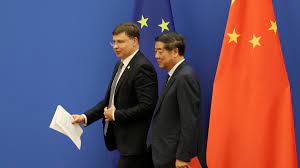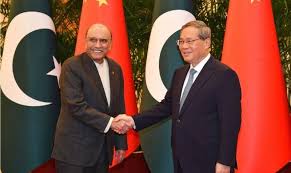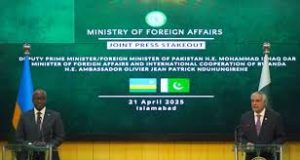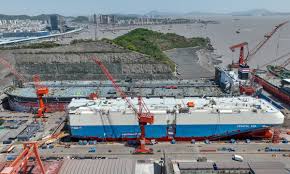EU, China rein in trade angst, set agenda for further dialogue

Beijing: The European Union agreed to resume dialogue and set up dispute settlement mechanisms to remain a part of China’s “success story” despite unresolved economic concerns, but it stopped short of halting trade remedies even as Beijing urged restraint.
“EU companies want to be part of China’s success story, which is why it’s important we devoted time to discuss the business environment,” EU Trade Commissioner Valdis Dombrovskis told China’s economy tsar, following an afternoon of talks covering market access issues and other trade barriers.
The 27-member bloc has long complained about the lack of a level playing field in China and the politicisation of the business environment. The world’s second-largest economy remains central to European firms’ supply chains, but executives are growing uneasy as the economy falters and geopolitical tensions rise.

The EU’s trade deficit with China widened to $276.6 billion in 2022 from $208.4 billion a year earlier, Chinese customs data show.
China said after the talks that it would be willing to take more European exports.
“China hopes the EU will exercise restraint in the use of trade remedy measures and stabilise the expectations of China-EU trade development,” Vice Premier He Lifeng, told the joint news conference at Beijing’s Diaoyutai State Guesthouse, where foreign dignitaries are often received.
The European Commission recently declared that it would investigate whether to impose tariffs to shield European producers from a “flood” of cheaper Chinese electric vehicle (EV) imports it says benefit from state subsidies.
The EU said it was open for competition, including in the EV sector, but that competition had to be fair. China has blasted the probe as protectionist.
“The European side should act with caution and continue to keep its market free and open,” He said in relation to the probe.
China also unveiled new laws this year including a foreign relations law warning against “acts” detrimental to China’s national interests and an anti-espionage law barring the transfer of information linked to national security that it does not specify, raising compliance risks for foreign companies.
“The question of legal uncertainty related to data … is causing real anxiety among European companies here in China,” Dombrovskis said. “We need to find a way to facilitate compliance of EU businesses with Chinese data laws.”
Dombrovskis announced both sides had agreed to set up two working groups to discuss the transfer of data in the financial services sector and market access issues in the cosmetics industry, as well as a mechanism to resolve supply chain disputes over raw materials.
Beijing’s move to strengthen ties with Russia despite the war in Ukraine has only added to the wariness of EU firms operating within the Chinese market, many of which are now shifting fresh investment to other developing economies as geopolitical concerns weigh heavy on the minds of investors.
“On this visit, I have been able to convey directly to the Chinese leadership some key messages that are vital for our relations,” Dombrovskis said, calling Russia’s invasion of Ukraine a “massive menace, endangering not only lives, but also global food supplies.”
In a speech at Beijing’s Tsinghua University earlier on Monday, the EU trade chief put the ball in China’s court, telling students that China “could do a lot to help reduce our perception of risk.”





